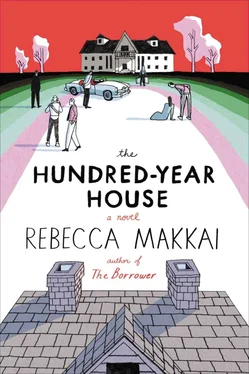Sofia was cleaning out the refrigerator, tossing old containers of deli salads Gracie and Bruce had never gotten around to eating. Zee wanted to ask her more about that dress, that yellow dress that had no reason to be on the floor, but now was not the time. It had been bothering her for weeks now, and the more she thought about it, the more she felt that somehow she’d seen it very recently, and remembered touching it. She’d started to consider that she might have done something in her sleep, walked to the big house and found the dress, crumpled it and hidden it from Miriam.
But this was ridiculous, and she’d long ago trained herself not to second-guess things to the point where she lost the reality of them. She used to worry all the time about losing her mind. In the library at boarding school she’d found a book, The New World Barons , published in the 1960s, with sections on the Palmers and Carnegies and Devohrs, among others. “The Devohr history is not one of summer estates and long lineage held taut by familial love; it is one of scandal, Diaspora, insanity.” She spent hours on the floor between shelves, reading about the Devohrs who killed themselves, the ones who vanished into Mexico, the one they found buried under old newspapers. She returned to the book many times, to trace the lines of the small, gray jaws with her pinky. Great-aunts and distant cousins. Her grandfather, Gamaliel, as a long-haired boy in a dress. (His mother, Violet, not a Devohr by birth and not a Devohr for long, merited mention only as “another suicide.”) Zee had never met any of them. Gracie’s parents died before Zee was born, and Gracie’s brothers were all “degenerates” to whom she no longer spoke. No cousins ever visited, no aunts. The Devohrs weren’t people so much as sea turtles that laid their eggs and then crawled back to the ocean, not particularly invested in meeting their progeny ever again. That she and Gracie were relatively close was a miracle.
Gracie said, “Do you think the college might find a job for Case as well? Something in the business office?”
Zee was still contemplating what kind of response this merited when Gracie’s phone rang. She answered it and handed it to Zee. It was Doug.
“Hey!” he said. “You’re at your mom’s!” He was a terrible actor.
“What’s wrong?”
“Nothing, no, I just wondered. So you won’t be back for a while?”
“Maybe an hour.”
“Okay. Like, a whole hour? Okay!”
She hung up and told her mother she needed to get going right away.
“It’s just as well. Some poor fellow’s coming over to take pictures. The architects are sending him. I don’t know what on earth he wants.”
Zee put her teacup in the sink, kissed her mother’s cheek, and ran out the side door. A car was pulling up to the front, the beat-up black Saturn of the architectural lackey, who had no idea what Gracie would put him through.
In the coach house, it seemed eerily like a normal Thursday afternoon. Miriam on the sunporch, fully clothed, working on her unloved dress collages. Case sulking at the kitchen table. Doug sprawled on the bed with Sports Illustrated , smiling, as if he’d been expecting her.
On the phone, Leland had said the pictures turned out but he wasn’t sure what the hell he was looking for. Doug didn’t know why this was disappointing. He hadn’t really believed Leland would find a cardboard box labeled “Parfitt’s Memoirs.” But somewhere between getting Leland into the attic, and getting Zee out of the house in time, and arranging this meeting down at the beach, Doug had come to assume there would be a major payoff. He’d stopped considering the possibility that Bruce was wrong about the file cabinets. That there might be nothing there but a pile of dusty bed frames. He’d forgotten that even if there were colony files, they might have just been heating bills.
It was a cool, sunny day, and Lake Michigan was Caribbean blue. Doug found Leland and Miriam at separate picnic benches on the grass between the sand and the cars. He introduced them, and Leland poured out an envelope of snapshots: windows, bureaus with missing drawers, piles of headboards and desk chairs, and yes, four black metal file cabinets, each two drawers high, with no visible locks.
“They were old enough. You see the script on the logo?” He’d managed to sneak a close-up of the manufacturer’s plaque on one cabinet. “Looks like what, forties? Fifties? That fits, right?” Leland attempted to lay the photos into the general shape of the attic. “It wasn’t easy,” he said. He was taking up one whole bench, his legs spread wide, looking at Miriam in her yellow shirt in a way that implied Doug had sold her short. “I didn’t tell her it was the attic I wanted till I’d thanked her a million times, told her what a jackass my boss was, how I was afraid I’d get fired. So by the time I said ‘attic,’ she’d feel bad saying no. Oh, and I told her my girlfriend was from Toronto. That helped. I don’t have a girlfriend, but hey. So she did say no, she told me there were bats and she hadn’t been up there in years. So I go, ‘Oh, well if it’s hard for you to climb, I can go by myself.’”
“Oooh, brilliant!” Gurgle of southern laughter, toss of curls.
“So twenty seconds later she’s marching up the stairs. And here.” He shuffled through the photos and found two of the attic door — one from outside, one from inside. “It’s a simple old lock. The key was just two prongs.”
“But she had the key on her?”
“No. I mean, I was exaggerating about the twenty seconds. Really she disappeared for five minutes and came back with the key. So sue me. I’m a poet. I’m prone to exaggeration.” He grinned at Miriam, who was too absorbed in the photos to notice.
“Here’s what I think,” she said. “I doubt there’s anything valuable there. No one would put a rolled up painting in a file cabinet.”
“But a poem!” Leland said. “A poem that was part of someone’s application!”
“Slides,” Doug said. “Letters of recommendation. Project proposals. Listen: Just this summer? The New York Public Library bought the archives from the Yaddo colony for some huge amount, and they’re saying there’s unpublished Carson McCullers in there. We’re not in the same league, but still.”
“So how do we convince her to let us look?”
Doug sighed and watched the joggers going past. He wasn’t sure if Gracie’s persistent and decisive evasion of Laurelfield history had to do with her guilt at having displaced the colony, or her shame at being associated with so many unwashed artists, but she hadn’t budged. At Bruce’s birthday dinner last week, when Doug had asked if historians had ever shown interest in documenting Laurelfield, Gracie had said, “Douglas, isn’t there something more productive you ought to focus on? Perhaps you could publish a novel.” (“What is her problem ?” Miriam had whispered later. “Her energy is so off.”)
“What if we talk her into donating it to a library?” Leland said. “Or the college?”
Doug said, “I think she’d sooner donate her kidneys.”
“It doesn’t seem that Gracie’s the right person to make the judgment call,” Miriam said. “She’s not a writer, she’s not an artist, she’s not a historian. And didn’t you say”—she turned to Leland—“it’s an easy lock to pick?”
When a man sat down at the next bench with his laptop they began whispering, but what they came up with over the next hour was a hypothetical scenario so risky that Doug knew he’d never pull the trigger on it. They were having fun though, and so he let Leland and Miriam plot.
They agreed that the best time to break into the attic would not be on one of the rare occasions when both Gracie and Bruce were gone. Sofia was usually around, as were Bruce’s personal secretary and the guy who came to walk Hidalgo. If someone met them on their way out, they’d have a hard time explaining the armloads of files. Miriam was the one who remembered the Democratic fund-raiser Gracie and Bruce were hosting in early December, which Doug and Zee and the younger Breens would be expected to attend. They could easily smuggle Leland in. Sofia would be working downstairs with the caterers. It would be loud. No one would hear if they had to bust down the attic door.
Читать дальше












